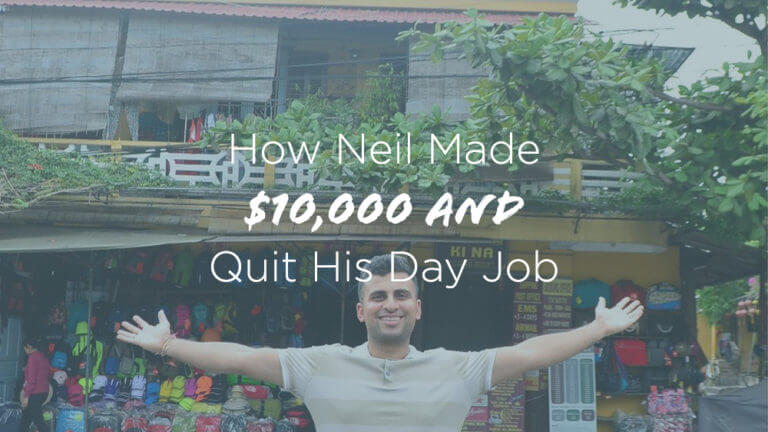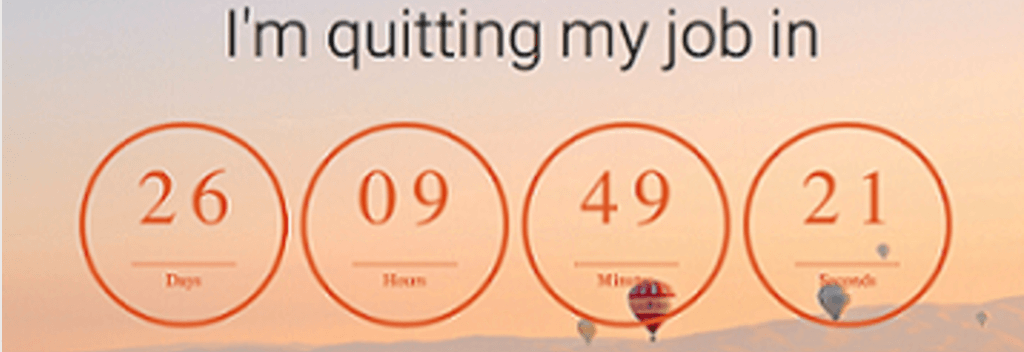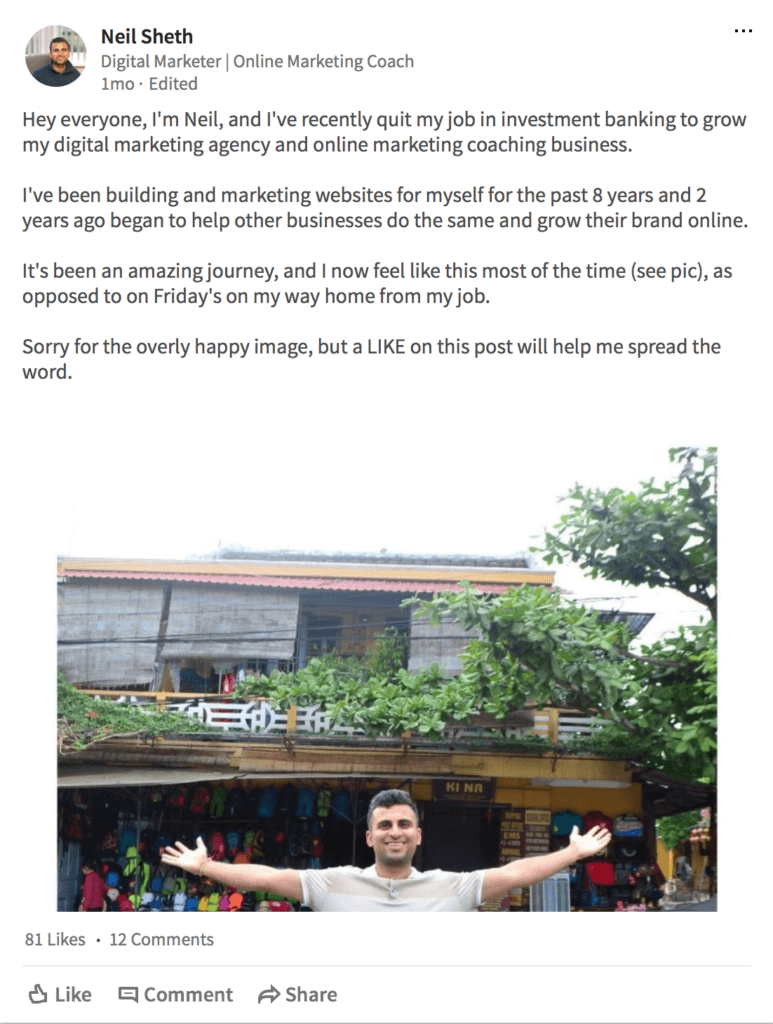Today’s post is coming to you from my friend Neil Sheth, the (now) owner of a digital marketing agency in London and a former investment banker from Goldman Sachs.
Just five months ago, he quit his day job to focus on growing his side business.
What’s great about Neil’s story is that he used several highly effective accountability hacks to make sure that he stayed on track with his mission of being able to leave his full-time gig.
He set realistic goals that’d eventually work him up to enough side income to afford quitting his full-time job.
Then, he found a clever way to hold himself accountable for achieving those goals (we’ll get to that soon).
In short, Neil set himself up for success.
And it’s paid off.
Here’s Neil relaxing, having a drink and enjoying some of the flexibility from his new-found freedom…
Now, over to Neil:
It took me 10 years of working in finance and launching side business after side business, in order to finally quit my job on December 31, 2016.
At the time of writing this article, it’s been about four months since I quit my day job.
I’ve had some of the most fulfilling months of my life…
• I don’t have that Sunday feeling anymore.
• I go to the gym when I want.
• It now takes me less than 10 seconds to get to the office (in my home), and not over one hour commuting each way.
What’s not to love about that?
The icing on the cake is that I’m doing something I love and actually seeing the positive impact I’m making with the businesses I’m working with.
EVERY. SINGLE. DAY.
Not only evenings and weekends anymore.
See, picking the right business is just one part of getting closer to quitting your job and making money on your own two feet.
Like, I must have launched eight businesses over the last decade.
Some failed straight off the bat. Some made money but not enough to quit my job. Others, I lost the interest in them after they were launched.
I did something different this time with my current business.
I held myself publicly ACCOUNTABLE to growing my side business and quitting my job by 31st December 2016.
If you’re wondering, how I held myself publicly accountable, go checkout the big clock on my blog, Watch Me Quit.
The clock has now been updated to reflect my income goal for the year, but here’s how it looked before I left my day job:
I’m now hooked on accountability hacks.
When you use accountability in the right way, you too can earn over $10,000 on the side, quit your job and create a business with the potential to earn $100,000 in your first year.
If you’ve never used accountability hacks before, your life and side business progress is about to change in a big way.
What You’re Going To Learn
• What is accountability (in the context of growing a side hustle)?
• Why you need to hold yourself accountable to grow your side business
• An entrepreneur case study who’s used accountability hacks successfully
• Three different ways to use accountability hacks
• How Ryan used accountability to validate a hiking guide for California and generate $108 in sales (which has now become Hike with Ryan, including his picks for Yosemite’s best hikes)
What Is Accountability (in the Context of Growing a Side Hustle)?
Let’s kick things off with a simple definition.
According to the Harvard Business Review, accountability is defined as, “delivering on a commitment. It’s responsibility to an outcome, not just a set of tasks. It’s taking initiative with thoughtful, strategic follow-through.”
Put even more simply, it’s saying you’re going to do something, and actually doing it.
It’s the same some concept as setting objectives, goals and deadlines while working at your full-time gig. Then your manager reviews your progress towards those goals.
If you’re continually missing the mark on all of your goals, it’s possible you’ll lose your job—the same thing goes when you’re running your own business, except both the positive and negative outcomes are more personally meaningful.
Creating this system is what I did for myself in the summer of 2016 on my blog.
I said I would quit my day job by the end of the year if I hit $5,000 in monthly business revenue.
Even though I fell a little short of my income target, I built up a healthy cushion of savings and decided to still leave my job to focus on growing my new company full-time.
The time constraints of my 9-to-5 made it difficult to take on more new clients, so at a point I was bottlenecking my earning potential.
But, I was able to leave my job and launch into a business that was already generating a growing income.
A good situation to be in you might say.
Why You Need To Hold Yourself Accountable To Grow Your Side Hustle.
One of the companies I used to work for is Goldman Sachs.
They are known to be one of the top investment banks in the world and when you hear this, you will know why.
I worked there for four years and I was pretty much maxed out everyday.
I would come home in the evening, have dinner and fall asleep. I had no energy to have a life during the week.
By the end of the week, I was desperate for the weekend.
By Sunday, I was desperate for Friday.
That’s what put Goldman Sachs in a superior league. Everyone worked like there was no tomorrow and it seemed that most people thrived on it.
Goldman Sachs employees took the word “ambition” to another new level.
There’s this culture of growth and achieving more and more and more. Not being settled or comfortable—EVER.
I believe that accountability had a large part to play in all of this.
Not only did I set my six month and yearly objectives with my manager, I also had weekly 1:1s to review and strategize how I was going to get there.
In one of my 1:1s my boss and I formulated a situation where I would have to present to the managing director of my department with a view to hit my year’s goal of building my influence with senior managers.
In another 1:1 meeting we created a list of all the managers across the company that I can aim to build relationships with and a list of the things that they were interested in so I can talk to them about something they wanted to listen to.
Setting a goal is normal, but figuring out a practical plan to achieve it and talking about it every week is only something I’ve experienced at Goldman Sachs.
Do you see the power of that?
That’s using accountability to hack your way to your goal.
Imagine the difference it’d make if every week you’re now forced to show up and provide an update on the progress of your side business—your commitment.
I’d been missing this with most of my business endeavors over the past 10 years.
It’s easy to put your side business the back seat when working full-time.
But when you have accountability, you have no choice.
Now, you still might not be sure if accountability hacks can help you get there, and that’s why I want to share five questions you need to ask yourself right now.
If you answer “yes” to one of these, then I’d recommend adding some accountability hacks to your business today.
If you answer “yes” to all of them, then you need some serious help in the accountability department, NOW. (Accountability is something Ryan places at the very core of his course 30 Days to Validate)
1. Do you come home after work and struggle to do more than 1 hour of work on your side business?
2. Do you work while watch Netflix or TV?
3. Do you work only on business tasks you enjoy and avoid the boring or difficult ones?
4. Have you spent more than 2 years trying to start your own business, but have not seen results you can be proud of?
5. Does your regular 9-to-5 salary give you a sense of comfort that if you’re business doesn’t work, then you’ll be ok?
If you feel like you can relate to any of these, then you need accountability hacks more than you know.
Now, let’s take a look at an established entrepreneur who has used accountability hacks to successfully grow her business.
An Entrepreneur Who Has Used Accountability Hacks Successfully.
I figured having an ultra successful entrepreneur share their experience with accountable would make this post even better.
So I asked Kate Erickson, from Entrepreneur On Fire, to share her experience with accountability. Entrepreneur on Fire hit around $250,000 in revenue in February alone, so it’s worth listening to what Kate has to say ?
Let me first tell you a bit about Kate.
Kate is a creator, engager and implementer over at EOFire, a 7-day a week podcast that interviews today’s most inspiring and successful entrepreneurs. She is also the host of Kate’s Take: The EOFire Audio Blog and author of The Fire Path: A Beginner’s Guide to Growing Your Online Business.
Kate is passionate about helping entrepreneurs create freedom in their business and life through developing systems and processes that can help their business scale and grow.
Quick note from Ryan—I’ve been talking a lot more lately about my experience growing my podcast to more than 500,000 downloads within the first 2 years, so if you’re interested in starting a podcast of your own, then check out my guide to the best podcast hosting platforms on the market today.
Here’s how she’s used accountability hacks to further her business goals & objectives.
1. Can you share a time where you have used an accountability hack to breakthrough or make a big impact in your business?
Yes! A couple of years back my accountability partner helped me finally realize what it is I’m BEST at. It was during a conversation where I was looking for support around feeling lost about the direction I was headed with the content and projects I was working on. Something just didn’t feel right – sometimes it felt as though I was working on things that weren’t getting me anywhere, and that certainly weren’t making a big impact within our business or for our audience.
Coming to this realization about what I’m best at has not only helped me become more focused on what it is I can provide that’s of huge value to my audience, but it’s also helped me work so much more efficiently and with purpose. Having a solid focus for the projects and content that I create has changed everything.
2. If you were to select an accountability partner, what’s one quality you would look for?
Someone who is bluntly honest.
3. How do you keep yourself honest to hitting your goals in a normal week?
I write things down and I create a plan for my day’s work the night before so that I’m never left wondering “what should I work on next?”
4. To those entrepreneurs who are still unsure about holding themselves accountable, what would you say?
Holding yourself accountable is the only way you’re going to be able to accomplish the goals you set. Not wanting to hold yourself accountable is the equivalent of saying that your goals don’t matter to you.
Accountability hacks are the quickest way for you to build a habit of continual accountability in your life (and side business).
3 Strategies For Using Accountability Hacks To Grow Your Business.
Ok, so making a public declaration on a blog, with a large countdown, may not be everyone’s cup of tea.
But that’s not the only accountability hack you can use to hold yourself accountable.
So, I want to share three other accountability hacks that can be massively impactful on your bottom line.
1. Hire An Industry Expert To Coach You.
A coach can help to replace your boss at work by making sure they put you on the hook for getting things done.
There are many generic business coaches who understand the key concepts of business and help you to reach your business goals. But I prefer working with someone with real experience and knowledge of my industry.
If I was hiring a coach, here’s what I would look for:
• Do they understand my industry? They score more points if they have a similar business
• How approachable and open are they about understanding my business?
• Do they have experience of helping other people?
• How successful are they?
• How can they help me and what’s their strategy?
• Do I like them as a person and do I see us getting along? This is really important.
For instance, I provide online marketing services and coaching, and even though this isn’t an actual service I formally offer, some people ask me to coach them on how to create a business online.
So, how do you find a coach that is right for you?
If you want the best of the best, looking for an expert in your niche online is where I would start.
I prefer to find people who share their expertise online through blogging, podcasting, content or social media. It not only shows me that they know know their stuff but they are also willing to help others by sharing it with the world.
Over the past 10 years, I must have spent around $20,000 on coaching and courses. I was paying true experts to help me reach my goals in half or less the time it would take to do it myself.
Good coaches not only tell you how to do it, they make sure you take action and hold you to account.
To set your expectations though, these experts do not charge a few hundred, they charge thousands and in my eyes are worth every penny.
2. Get an Accountability Partner.
But what if you don’t have the budget to hire an expert to coach you?
Get yourself an accountability partner who can relate to your goals, objectives and line of work.
You can find someone that shares the same values as you, is in a similar situation and as Kate mentioned above, is bluntly honest.
By becoming accountability partners, you can both share your journey and help each other along the way. Just being able to talk through an issue and have an outside opinion can really help you to breakthrough and make strides.
This is one of the biggest benefits of blogging about . Every month I write a monthly update, which forces me to take a step back and see my business from a distant. It helps me to keep my sales and the number of leads my business has (potential business) top of mind.
But it’s crucial that they don’t just become another one of your friends. The purpose of this relationships is ACCOUNTABILITY.
If you’re meeting up for one hour and talking about movies and football (my two passions 🙂 ), for 45 minutes, then you’ve both lost sight.
Sure, spend 10 minutes catching up, but most of that time needs to be spent talking business. I’d expect an accountability session to include things like: business issues, achievements last month, plans for next month and pushing each other to hit your targets and more.
However, the second you feel like you’re ambitions are not in line, it’s time to find someone else.
So, how do you find an accountability partner?
Start with local networking events around your specific niche.
You can find events using meetups and eventbrite. I’ve even found events through local Facebook groups I’m part of.
Go to as many events as you can and get to know as many people in your industry as you can.
Sooner or later you will hit it off with a handful of people who you want to keep in touch with. These are your potential accountability targets. 🙂
I’ve also seen people become partners through Facebook groups they are involved in. It takes longer to build a relationship with someone online, but it can be very effective.
Tools like Skype, Facebook Instant Message and Whatsapp have helped to make this world a smaller place.
3. Make a Public Declaration.
Creating a blog with your goals is one way of holding yourself accountable publicly, but there are a few other ways that are quicker to implement.
And I don’t mean telling your friends and family.
They will always support you no matter what, and that’s the problem.
You need something that makes you feel under pressure to actually do what you said you were going to do.
You could post your commitment on LinkedIn. Tell your network and their network what you’re planning to do. Who knows what may come of this, when you’re network see what you’re doing.
I recently posted about quitting my job and growing my business on LinkedIn and received two potential leads for new websites. 🙂
You could also mention your goals to a group or community you are part of: Are you part of a business group? Are you a regular participant in a closed Facebook or Forum community? If not, perhaps it’s time to look for some.
When you make your public declaration, it’s important you’re goal is crystal clear.
I like to follow the SMART criteria. Your objective needs to be:
• S = Specific
• M = Measurable
• A = Agreed Upon
• R = Realistic
• T = Time-Related
Let’s take a look at my example.
My objective this year is to hit $100,000 in sales by the end of December 2017.
It’s “specific,” easy to “measure,” I own it so easily “agreed upon” and has a clear “deadline.”
I would only question whether I am being “realistic,” but I want to stretch myself and that’s why I’m sticking to it. 🙂
How Ryan Used an Accountability Hack To Validate a Hiking Guide For California and Generate $108 in Sales
You may have seen Ryan’s post where he went public with his business Validation Challenge during December of 2016.
Ryan’s readers (hey, that’s you) wanted him to validate a hiking guide for California and it succeeded.
Before the guide was even created, Ryan sold 12 copies for $108 and most importantly validated that a business around this guide exists.
Ryan could’ve easily gone about his business in private, especially with the risk of massively failing in front of you all.
So I asked Ryan to share his reason for putting himself out there and his experience of accountability.
Here’s Ryan:
The biggest reason I decided to do my validation challenge publicly is because I wanted my readers to see just how easy it can be to validate an idea—and that failures (whether small or large) are a natural part of the process no matter what.
There were a TON of things I tried that didn’t work out as planned.
• Hours of time wasted reaching out to Instagram influencers, asking for promotion of my hiking gear giveaway.
• Dozens of emails to friends and even family that went unanswered.
• My giveaway making it onto Reddit and getting a ton of unqualified signups.
If I hadn’t been holding myself publicly accountable for delivering weekly updates on the blog, it would’ve been tempting not to share my failures—but that was exactly what I wanted my readers to see.
The real takeaway I wanted my readers to have by watching me hold myself accountable to achieving a meaningful goal in just one month, is to see that building a business isn’t all sunshine and rainbows.
It’s not always glamorous. Some of your best friends may not support you in your idea. You might not earn a penny your first month.
But when you set smart goals for your side business and use accountability hacks to work your way there, the chances of success go up dramatically.
If you’re still working in a job, you’re probably used to setting your objectives every year and then having your manager review your performance against these objectives.
Like me, I’m sure you didn’t really enjoy doing this.
But, now that I’ve stopped working for someone else, I’m beginning to see why I need to continue this process to grow my business.
It’s easy.
Just set yourself a goal, a specific plan to achieve that goal, and then an accountability strategy to keep your eye on it.
Stop delaying your success, and start now.
Which one of the accountability hacks resonates with you most?
Leave a comment below with your opinion and the action you’re going to take.
I’d love to hear it.
Neil runs a digital marketing agency and teaches online marketing to entrepreneurs and small businesses.
Neil specializes in SEO, Content and Email marketing. He quit his job on 31st December 2016 and held himself publicly accountable on his blog, Watch Me Quit.
Now, he opens up about how he is growing his business so you can learn from his successes, mistakes and apply it to your own business.








Hi Neil,
Congrats for kickstarting your career. And welcome to Ryan’s blog.
You’re going to get a lot of shares and comments. I hope you’re prepared 😉
I like the point you made there- It’s so important to have an accountability partner. We’re not wolf, we’re human and so we need support.
Thanks for posting this content bomb. Sharing it on my Twitter & Facebook 🙂
Woo! Agreed.
Thanks for an awesome post, Neil!
I have an accountability partner too. We have weekly check-ins, usually over email to update the status on our biggest deliverables. Break down the wins, losses and reasons why for each.
This post highlights something that I’ve intuitively continued doing since leaving full-time employment, but it’s tempting to throw away this type of 1-on-1 check in and transition over to self-management when you don’t have anyone you’re technically responsible to (aside from clients and customers).
Accountability hacks for the win! ?
Thanks for the inspiration. Accountability is crucial. Especially when resistance rears its head, in subtle ways too.
I had a two accountability partners a couple years ago. The difference between the two was drastic. One held me to my word, talked with me about my business, and inspired and motivated me. The other felt more like a friend. She didn’t really have a strong enough will to hold me to my word. Even though I moved on from that side business, I learned a lot about quality accountability.
Your message will help many people. Thanks for sharing!
It’s actually energy sapping starting a side business while full time elsewhere. With this “accountability hacks”, I think it will increase the chance to succeed. The truth is that, without being accountable, it is almost impossible to succeed in any venture
Accountability is the open secret for success in the corporate world.
Thanks Ryan for sharing this thought.
Hi thanks for this article, from Rwanda as a teacher In secondary school, low monthly paid, I need enough advice of how I could start my own business.
Congratulations Nell! I’m also need to quite my job, but I’m harder to make decision!
This was one of the better articles I’ve read on accountability. Thanks for sharing Neil! I really like the making it public aspect. That’s a game changer for sure!
It seems an all too common problem whether it’s a side hustle or a more involved online venture is the idea of wanting to create and do it mostly on your own. I think it’s also the “newness” factor and an unwillingness to share your idea and seek accountability until it’s a more “proven” concept. I’m susceptible to that and trying to improve.
I love reading all of your blogs and I’m
Passionate about starting my own side hustle. The accountability hack you’ve written about today is a simple yet powerful idea that I can see would help anyone and everyone.
I’m finding that my biggest problem is finding that idea so I can even begin my path with. It’s definitely difficult to come up
With an idea or a product to sell or something markeatable.
Dear Neil,
Congratulations on the well established article.
You have been a real source of inspiration and motivation for all those people who want to make the step to become an Entrepreneur.
Dear Ryan, congrats on all your activity, you are being also from here, from the United Kingdom and you have a lot of followers, including me.
I am also in that position, where I find it hard to make that decision.
Looking forward to new posts and articles!
Congratulations!
Regards
Silviu, UK
Hey, sometimes I get a 500 site message when I view this page. Just a heads up, cheers
Business loan Offer at 3% Interest Rate. Are you a business man or woman? Are you in any financial stress? NEED MONEY to start your own business or improve your business finance, do you have a LOW INCOME and difficult to obtain loans from local banks and other financial institutions? Interested persons should contact us via: store_mutual{at}hotmail.com. We offer the following types of loans and many more; *Home Improvement *Inventor Loans *Car Loans *Debt Consolidation Loan *Line of Credit *Second Loan *Business Loans *Personal Loans *International Loans. Please write back if interested. Upon Response, you’ll be mailed a Loan application form to fill. (No social security and no credit check, 100% Guaranteed!) I Look forward permitting me to be of service to you. You can contact us via e-mail: store_mutual{at}hotmail.com OR Text us your email address and we will get back to you with the loan application form. Yours Sincerely, Ryan MD.